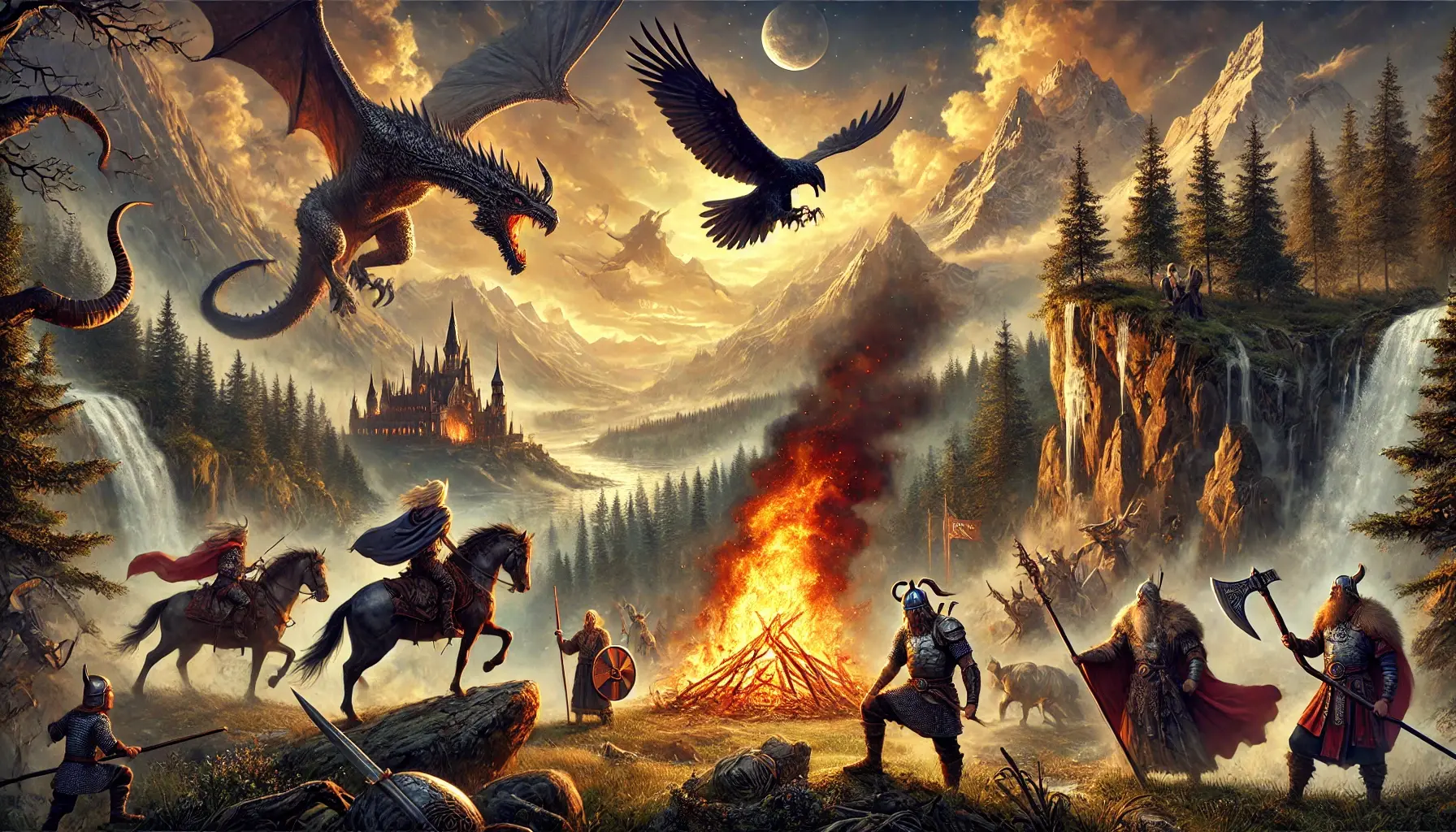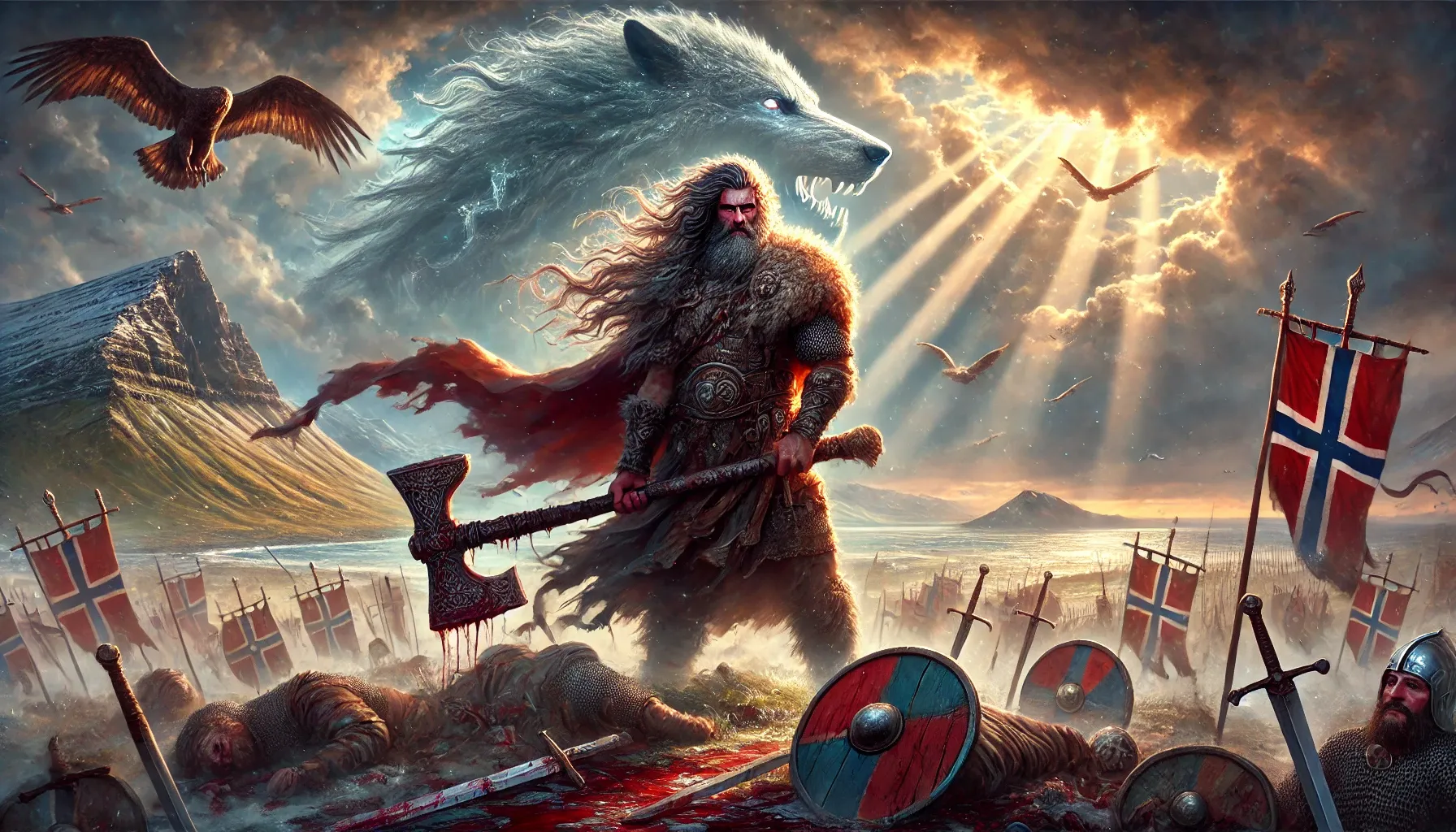The Line of Volsung: A Seed Planted in Fire
In the heart of the ancient Northlands, where mist-wreathed forests clung to jagged fjords and the winter sun lay low in the heavens, the lineage of Volsung took root. Born of Rerir, a king whose despair at childlessness summoned a divine answer, the seed of this great line was delivered not by mortal means but through Odin’s hand. A magical apple, gleaming gold as the dawn, brought fertility to Rerir’s queen, and thus Volsung was conceived. His birth, after six long winters, was not ordinary; his mother bore him upon her deathbed, her life ebbing as his began. Yet even in his cradle, Volsung radiated strength, his cries like the call of a war horn heralding an unbroken destiny.
Volsung’s hall was built around the mighty oak tree Barnstokkr, its roots deep in the earth and its crown reaching toward the gods. Here, the family flourished, the hall resounding with laughter and song, while tales of ancient heroes were told by the flickering firelight. Yet, fate—that immutable force stronger than any king’s will—whispered ominously through the boughs of Barnstokkr.
Sigmund and the Sword of Fate
Volsung’s son, Sigmund, grew mighty among his siblings, unmatched in courage and skill. His twin sister, Signy, shared his fiery spirit but was bound to a darker destiny. When Signy’s hand was offered in marriage to Siggeir, the scheming king of Gautland, her heart brimmed with foreboding. Sigmund, too, mistrusted the union, but their father, Volsung, dismissed such fears, choosing alliances over omens.
At the wedding feast, as mead flowed and oaths were exchanged, a cloaked figure entered the hall. Odin himself, unrecognized but feared, drove a sword into Barnstokkr’s trunk, declaring it a gift to the one who could draw it forth. Each warrior’s attempt failed, the blade refusing all hands until Sigmund grasped it. With a single, fluid motion, the sword sang free, its steel gleaming like the icy rivers of the North. Siggeir, burning with envy, offered gold for the weapon, but Sigmund refused, sealing his brother-in-law’s enmity.
Betrayal soon followed. Siggeir lured Volsung and his kin to Gautland under the guise of peace but unleashed treachery upon them. Volsung fell in battle, his sons taken captive and bound to die in the wilderness, their flesh left to the wolves. Night after night, Signy, now queen, watched in silence as her brothers perished, until only Sigmund remained. Driven by love and vengeance, she devised a plan, sending her youngest son to aid Sigmund. Together, they slew the she-wolf, and Sigmund escaped into the forest, his hatred sharpening into a blade.
The Fires of Revenge
For years, Sigmund and Signy plotted vengeance, their bond forged in shared grief. Signy’s spirit darkened as she sacrificed everything—even her own children—to see Siggeir undone. In a final act of resolve, she bore a child by her own brother, hoping to create a warrior pure of Volsung blood. This child, Sinfjötli, grew strong and fearless under Sigmund’s tutelage.
When the time for retribution came, Sigmund and Sinfjötli set Siggeir’s hall aflame. The crackling inferno consumed the treacherous king and his men, their screams rising with the smoke into the night sky. Signy, her vengeance fulfilled, chose to perish in the fire, walking into the flames as a living pyre. Her final act, both tragic and defiant, carved her name into the annals of fate.
The Dragon Slayer’s Path
Sigmund lived to father a son, Sigurd, who would eclipse his deeds. Raised in exile by the cunning Regin, Sigurd’s destiny entwined with the dragon Fafnir, whose hoard of cursed gold had long been a blight upon the land. Forging a sword from the shards of Sigmund’s broken blade, Sigurd embarked on his fateful quest.
With the sun’s first light glinting off his helm, Sigurd confronted Fafnir. The earth trembled as the dragon’s coiled bulk moved, its breath scorching the air. Yet Sigurd was undaunted. Lying in a trench beneath the beast’s path, he struck as it passed overhead, driving his blade into its heart. As Fafnir’s lifeblood soaked the ground, Sigurd tasted the dragon’s blood, gaining the ability to understand the speech of birds. The feathered messengers warned him of Regin’s treachery, and Sigurd acted swiftly, killing his mentor before betrayal could strike.
Brynhild and the Web of Wyrd
Sigurd’s fame spread like wildfire, and with it came love and doom. He awoke the shieldmaiden Brynhild, imprisoned in a ring of fire for defying Odin. Her beauty was rivaled only by her pride, and the two swore themselves to each other with passion as fierce as the storms of the North Sea. Yet fate, ever cruel, intervened.
Through deception and magic, Sigurd was ensnared by Grimhild, the queen of the Nibelungs, and wed her daughter, Gudrun. Brynhild, betrayed and wrathful, demanded vengeance. Her schemes set the Nibelungs against Sigurd, leading to his death at their hands. Even as he fell, pierced by spears, Sigurd’s gaze held no malice, only the weight of betrayal and love lost.
Brynhild, consumed by sorrow, ended her life upon Sigurd’s funeral pyre, their flames mingling as if to defy the gods’ decree.
The Ashes of the Volsungs
The legacy of the Volsungs burned brightly, even in its ruin. Gudrun, left to mourn Sigurd, carried his memory into a world darkened by vengeance and despair. Her grief bore new tales, her children destined to weave their own threads into the tapestry of fate.
In the end, the Volsungs’ story was one of fire—of hearths that warmed, of halls that burned, and of flames that consumed yet illuminated. It was a saga of pride and passion, of love and betrayal, where even the mightiest fell to the inexorable tide of destiny.
Amidst the ruins of Sigurd’s pyre, a raven perched on the charred remnants of his sword. Its eyes, black as the void, reflected the stars above, as if the heavens themselves bore witness to the weight of mortal glory. And in its silent vigil, the raven became a symbol of what endures: the eternal, unyielding memory of deeds that sing through the ages, whispering their truths to those who dare to listen.



